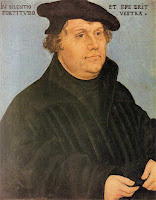We
all have one, (said Rafferty), a guardian angel. Do we, thought I.
Sometimes I'm not so sure … I strain to see the flying angel pinned
to the lapel of his wrinkled blue jacket and fail, though I think I
can just make out in the fading light a green and gold harp on the
other.
He's
told (by a woman) 'No one is given a life just to throw it away.' Is
that what I'm doing too, I ask, though more quietly, less
destructively than Rafferty. Rooted to place, yet exiled in the mind
from society. Maybe.
Delia
serves the dog its usual saucer of tea with milk. And I instantly see
Nan serving Sam-dog the same in a bowl, his post-lunch,
post-beach-walk thirst quenched, the same as ours.
Delia
has lost the rapport she once had with God. The prayers she mouths
less heartfelt now. And yet her heart feels all the things she has
forgotten. That is why she cries. But why am I crying? I have
forgotten what it feels like to be hugged, to be touched.
Mildred
has loved too well. Her heart remembers and still registers (as does
mine) thunderbolts. Yes, full of Desdemona. Yes, full of the youthful
pursuit, of the unexpected visits of Mr Gentleman. Her heart given
outright – never
do that
– but she gave. Unwisely, yes. With the voice of Molly Bloom. Yes!
And all the style that Joyce possessed. Edna O'Brien, yes, I think I
think I think.
*
Always
a surprising twist – violent, confronting, shocking. Always a
distance, a part cut off. Always a feeling, some similarity or some
memory dredged up. Edna O'Brien, yes. A remoteness, a closeness. A
contradiction, a desire. A boundary crossed. And an all too human
response. A question, an answer, an observation. The reader asks of
him or her self the same. Who am I, what am I. Repeats after vain
McSorley, the quarry owner: 'Be absolute in your aim.' What aim, what
aim. Then tells him or her self in a firm or fragile tone: It will
come. Will come.
*
Something
always remains, something always festers. Remembered love, lost love.
An Edna O'Brien scene forever ruminated on. The hated scene, the
public scene. Women's scenes – embarrassing their men, their
children. Scenes between strangers, neighbours, mothers and
daughters, cousins, lovers. A scene imagined, filled in, embellished
even with my own imaginings. The actors my own imperfect characters:
real known people.
A
scene of taking tea at the Coughlan house: a matching China tea set
(cups and saucers, milk jug and sugar bowl), serving plates with
shop-bought eatables placed on nesting tables. The role of Mama
played by my own dear long departed nan, the daughter-narrator played
by a young version of my mother. I hear Mrs Coughlan debate with Nan
whether it was best to whip cream with a fork or a beater, or to, in
some instances, vigorously shake the container. Mrs Coughlan saying
to Mum, the daughter: 'But why ever did you come back from
Australia?' And Mum explaining it was only a long working holiday;
they were always – her and her beau – going to return. Mrs
Coughlan, though, is not really listening, she's lost in her own
thoughts, someplace else.
The
emotional landscape changes …
I'm
with Miss Gilhooley, 'the Spinster', who has had her quota of love.
Have I had mine? Was
that all? Have
I ever felt safe and confident with, next to anyone? Oh hollow heart.
I've let myself go when once upon a time I would have cared more.
I've turned more and more to literature for love, for new friendship,
for all the experiences I won't have.
A
different female narrator enters … then another … There's
something to take from each ( a narcissistic exercise), something
perhaps that only I know or see or feel unbeknownst to or unperceived
by others.
Will
my words, if they outlive me, also tell of a woman desperately trying
to explain herself?
Oh
Edna O'Brien, yes, you've done it now.
Literature,
the only alchemy there is.
Picture credit: Desdemona, Frederic Leighton (source: WikiArt).
See
Saints and Sinners by Edna O'Brien.
Journal entries, October 2022.












